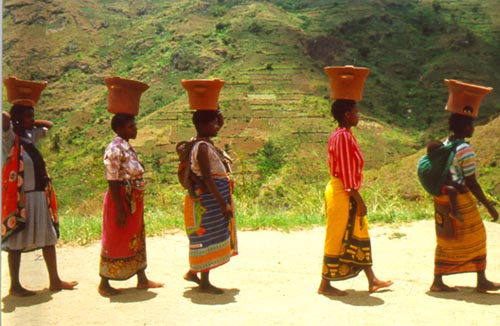
Peace Corps Programs in Tanzania
In January 2000, a new School Health Education Project in Tanzania was launched. The project aims to prevent the spread of HIV/AIDS and increase healthy lifestyle among youth. Using a peer education and life skills model, Peace Corps Volunteers work in Primary and Secondary Schools as well as with out-of-school youth.
Education
Secondary education is a major focus of the Peace Corps program in Tanzania. The country has a critical shortage of math and science teachers at the secondary school level and, due to lack of financial and human resources, the Ministry of Education is not able to attract the number of teachers that it requires. Current Volunteers teach mathematics, geography and science in both private and public schools. They are also involved in teacher training, resource identification and development, curriculum improvement, extracurricular and community projects. Peace Corps Tanzania has been active in the development of a Community Content-Based Instruction (CCBI) approach to teaching. Under this initiative, Volunteer teachers strive to incorporate issues important to the surrounding community into their lesson plans. Many Peace Corps Volunteers in this Project have been involved in initiatives to address HIV/AIDS issues, girls empowerment, environmental education, computer instruction, leadership development and school infrastructure development.
Environment
In May 1995, Peace Corps/Tanzania launched the Peace Corps/Tanzania Environment Project. In collaboration with U.S. Agency for International Development, the projects focuses on four districts of the country: Hanang and Babati in the North Njombe and Mafinga in the South. Volunteers work with district government extension teams and local residents to improve management of natural resources. They focus on such issues as land degradation, soil improvement, environmental education and implementation of agroforestry techniques with an emphasis on working with women and youth.
Health
Launched in 2000 in cooperation with the Ministry of Education and Culture, the School Health Education Project aims to significantly and positively impact on the health knowledge, health attitudes, and health behaviors of Tanzanian youth, particularly in the area of HIV/AIDS prevention. A wide range of health education interventions are employed in the classroom, the school, and the broader community to reach students, teachers, out-of-school youth, and community members. Volunteers are assigned to secondary schools where they serve half-time as teachers of science and integrate relevant health content into their teaching. As health educators, they also promote school health initiatives, such as clubs, workshops, and exhibits, at their schools and other secondary and primary schools. Developing peer education and life skills training programs with both in-school and out-of-school youth is also part of their work.